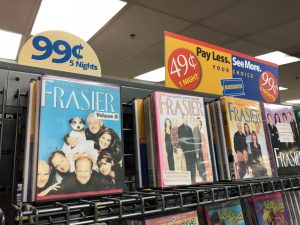 Here’s an interesting long read over at Retail Dive on the death of Blockbuster Video:
Here’s an interesting long read over at Retail Dive on the death of Blockbuster Video:
Who Really Killed Blockbuster?
A couple of interesting (to me) takeaways. First, I like that this article gives all the details other than just saying “Netflix, duh” because that’s not what happened. The thing that annoys the hell out of me in death-of-malls or death-of-<store dying this week> is that they always say it’s Amazon, and it almost never is just Amazon. (I.e. venture cap choke-out run by a fervent Ayn Rand acolyte; tax scam by REIT not paying off anymore; etc.)
Like one of the factors the article mentions that most people forget: VHS tapes were damn expensive, and that was partially hidden to the consumer. Yes, you could buy a priced-to-own copy of Wayne’s World for twenty bucks during a certain limited sales cycle. But if you’ve had the good fortune of losing a copy of Apocalypse Now from a rental place, it probably cost you eighty bucks to replace it. They ran this two-tier pricing scheme for decades, and then when DVDs came out, the studios decided to go with low daily prices across the board, plus they flooded the channel at Wal-Mart and Target with cheap five-buck releases and multi-packs of their back catalog. That’s only one of the nails in the coffin, but that’s an interesting one.
The other thing, and this came up in discussion when I posted this article on FB, is that Blockbuster wasn’t that great of a place for customers anyway. There are a lot of folks nostalgic for the Nineties who were born in like 1998 and don’t remember how crappy some of it was, and Blockbuster was a good example. Like they were borderline predatory about their late fees, and good luck if you got sent to their collections department. They drove a lot of mom-and-pop rental places out of business. And their prices weren’t always great, compared to the non-chain places.
One of the things that always bugged me about Blockbuster was their family-friendly video selection. They were big on promoting mediocre big-budget movies and avoiding cult or obscure cinema. And they were incredibly vocal on not carrying anything beyond an R rating, or controversial movies. I went on a semi-boycott of Blockbuster for years because they refused to carry The Last Temptation of Christ. If you wanted obscure, it’s Not at The Block. If you need a copy of Day For Night, forget it. But they’d have plenty of copies of that new Will Smith movie.
Blockbuster was occasionally a necessary evil when I was in a small town. I really loved local rental stores that had obscure stuff, and of course you had to go to one of those places for the best horror movies. The clerks were always cool, the prices were lower, they didn’t give you as much of a hassle about membership, and sometimes you’d find weird stuff. Like there was a video place in downtown Bloomington — I wish I could remember the name. They never recycled out their old stock. Me and Larry used to go every week and find the most bizarre stuff, faded boxes that were completely forgotten. Like I remember never ever being able to find a copy of Johnny Got His Gun (probably because Metallica bought the rights to it and sat on them) and of course they had it. And I remember renting Deranged: Confessions of a Necrophile, the (bad) Canadian horror movie loosely based on Ed Gein, and it also had the short documentary Ed Gein: American Maniac slapped on the end of the VHS. It was a weird homemade doc consisting of blurry found footage, narrated by some dude in a basement recording on a Bell and Howell mono tape recorder stolen from an elementary school or something. It was awesome. (And it’s on YouTube!) You’d never, ever find that at Blockbuster.
That puts Blockbuster nostalgia in a weird place for me, much like Barnes and Noble. I’m a bit sad B&N is on the verge of shuttering, but back in the day, they were the chain to hate, because they pushed mom-and-pop stores out of business. (And deep analysis that I’m too lazy to do might show a story that independent booksellers were pushed out by someone else in the 80s/90s, like the rise of Ingram or the changes in book printing after NAFTA, or some damn thing.)
I visited one of the last Blockbusters in Anchorage a year and a half ago. (Yes it was the one with the Gladiator jockstrap. No, it wasn’t there yet when I visited.) It gave me a strange and sad feeling, not specifically because it was Blockbuster, but because it was a video store, period. It was all DVD, but wandering the aisles reminded me of the weekly exercise of going from A to Z on a Friday night to find what I’d watch.
That entire era is gone, replaced with a button on my TV remote that lets me scroll through thousands of titles. But something’s missing, with the lack of the Tarantino-esque clerk telling me what I really need to watch, and the tactile experience of pacing the aisles. We now have great convenience and instant access, but it is at a cost that’s hard to quantify, and it’s definitely felt by those who do remember.
Leave a Reply